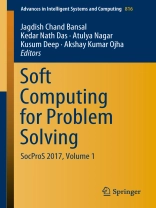This two-volume book presents outcomes of the 7th International Conference on Soft Computing for Problem Solving, Soc Pro S 2017. This conference is a joint technical collaboration between the Soft Computing Research Society, Liverpool Hope University (UK), the Indian Institute of Technology Roorkee, the South Asian University New Delhi and the National Institute of Technology Silchar, and brings together researchers, engineers and practitioners to discuss thought-provoking developments and challenges in order to select potential future directions The book presents the latest advances and innovations in the interdisciplinary areas of soft computing, including original research papers in the areas including, but not limited to, algorithms (artificial immune systems, artificial neural networks, genetic algorithms, genetic programming, and particle swarm optimization) and applications (control systems, data mining and clustering, finance, weather forecasting, game theory, business and forecasting applications). It is a valuable resource for both young and experienced researchers dealing with complex and intricate real-world problems for which finding a solution by traditional methods is a difficult task.
Tabla de materias
Hindi Speech Synthesis Using Paralinguistic Content Expression.- Stability Analysis and Controller Design for Unstable Systems Using Relay Feedback Approach.- A Novel Approach to Handling Forecasting Problems Based on Moving Average Two-factors Fuzzy Time Series.- Linking Brainstem Cholinergic Input to Thalamocortical Circuitry.- Using NSGA-II to Solve Interactive Fuzzy Multi-objective Reliability Optimization in Complex System.- Detecting Image Forgery in Single-sensor Multispectral Images.- A Hardware Architecture Based on Genetic Clustering for Colour Image Segmentation.- Bat Algorithm Based Traffic Signal Optimization Problem.
Sobre el autor
Dr. Jagdish Chand Bansal is an Assistant Professor at the South Asian University, New Delhi, India and visiting research fellow at Liverpool Hope University, Liverpool UK. He has an excellent academic record and is a leading researcher in the field of swarm intelligence and has published numerous research papers in respected international and national journals.
Dr. Kedar Nath Das is an Assistant Professor at the Department of Mathematics, National Institute of Technology, Silchar, Assam, India. Over the past 10 years, he has made substantial contributions to research on ‘soft computing’. He has published several research papers in prominent national and international journals. His chief area of interest is in evolutionary and bio-inspired algorithms for optimization.
Prof. Atulya Nagar holds the Foundation Chair as Professor of Mathematical Sciences and is Dean of the Faculty of Science at Liverpool Hope University, UK. Prof. Nagar is an internationally respected scholar working at the cutting edge of theoretical computer science, applied mathematical analysis, operations research, and systems engineering.
Prof. Kusum Deep is a Professor at the Department of Mathematics, Indian Institute of Technology Roorkee, India. Over the past 25 years, her research has made her a central international figure in the area of nature-inspired optimization techniques, genetic algorithms and particle swarm optimization.
Dr. Akshay Kumar Ojha is Associate Professor at the School of Basic Sciences, Indian Institute of Technology, Bhubaneswar, Odisha, India. He completed his B.Sc., M.Sc., and Ph.D. at Utkal University in 1978, 1980, and 1997, respectively. His research interest areas are geometric programming, artificial neural networks, genetic algorithms, particle swarm optimization, fractional programming, nonlinear optimization, data analysis and optimization, and portfolio optimization. Dr. Ojha has 34 years of experience and has published over 30 journal articles and 6 books.












